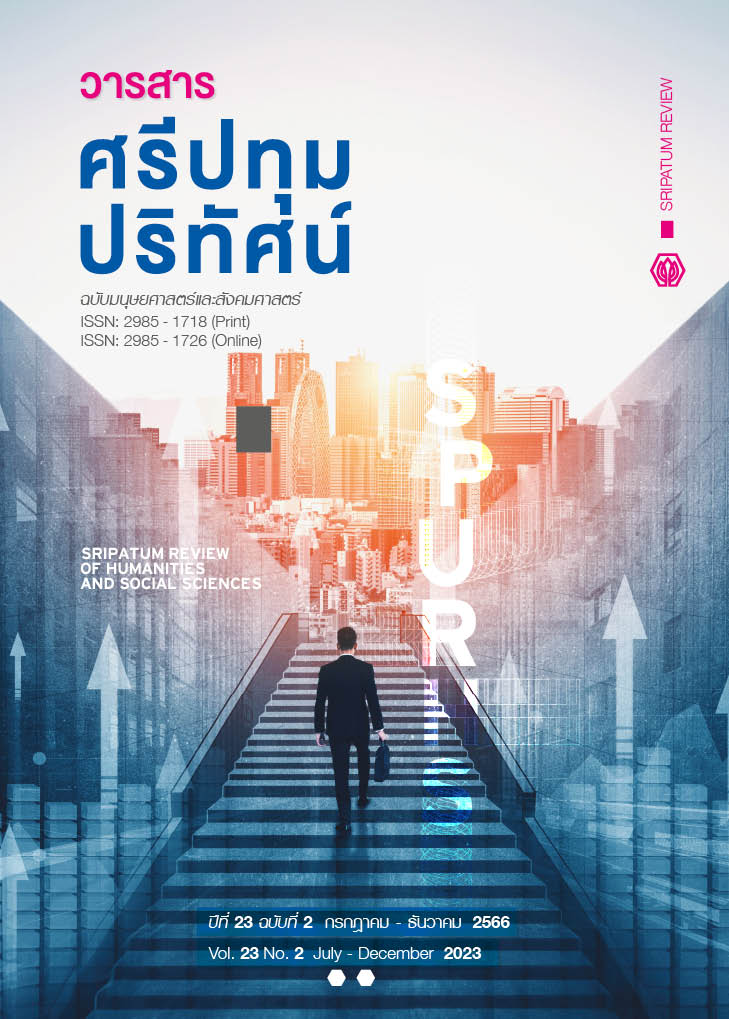Using Microlearning to Develop Chinese Communication Skills of Primary School Students
Main Article Content
บทคัดย่อ
Article Details

อนุญาตภายใต้เงื่อนไข Creative Commons Attribution-NonCommercial-NoDerivatives 4.0 International License.
1. กองบรรณาธิการสงวนสิทธิ์ในการพิจารณาและตัดสินการตีพิมพ์บทความในวารสาร
2. บทความทุกเรื่องจะได้รับการตรวจสอบทางวิชาการโดยผู้ทรงคุณวุฒิ แต่ข้อความและเนื้อหาในบทความที่ตีพิมพ์เป็นความรับผิดชอบของผู้เขียนแต่เพียงผู้เดียว มิใช่ความคิดเห็นและความรับผิดชอบของมหาวิทยาลัยศรีปทุม
3.การคัดลอกอ้างอิงต้องดำเนินการตามการปฏิบัติในหมู่นักวิชาการโดยทั่วไป และสอดคล้องกับกฎหมายที่เกี่ยวข้อง
เอกสารอ้างอิง
Akbar, Z., Khan, R. A., Khan, H. F., & Yasmeen, R. (2023). Development and validation of an instrument to measure the Micro-Learning Environment of Students (MLEM). BMC Medical Education, 23(1). https://doi.org/10.1186/s12909-023-04381-3
Autila, R., Syafar, D. N., & Yulmiati, Y. (2023). Students’ attitude toward e-learning during the COVID-19 pandemic at the informatics department of Universitas Pgri Sumatera Barat. Jurnal Ilmiah Mandala Education, 9(1), 1-8. doi:10.58258/jime.v9i1.4072.
Darma, P. S., & Supriyanto, A. S. (2017). The Effect of Compensation on Satisfaction and Employee Performance. Management and Economics Journal, 1(1), 69-78.
Díaz-Millón, M., Rivera-Trigueros, I., & Gutiérrez-Artacho, J. (2023). Student satisfaction with a micro-learning approach in distance translation and interpreting training: an empirical investigation. The Interpreter and Translator Trainer, 17(3), 434-453. doi:10.1080/1750399X.2023.2237322.
Grant, M. M. (2019). Difficulties in defining mobile learning: Analysis, design characteristics, and implications. Educational Technology Research and Development, 67(2), 361-388.
Horst, R., Naraghi-Taghi-Off, R., Rau, L., and Dörner, R. (2020). Bite-Sized Virtual Reality Learning Applications: A Pattern-Based Immersive Authoring Environment. J. Univers. Comput. Sci., 26(8), 947-971.
Hug, T. (2005). Microlearning: a new pedagogical challenge. Innsbruck: Innsbruck University Press.
Kossen, C., and Ooi, C. Y. (2021). Trialing micro-learning design to increase engagement in online courses. Asian Association of Open Universities Journal, 16(3), 299–310.
Leong, K., Sung, A., Au, D., and Blanchard, C. (2021). A review of the trend of microlearning. Journal of Work-Applied Management, 13(1), 88-102.
Liu, X. (2023). Investigation on the Current Situation and Response Methods of Oral Communication Teaching in Primary School Chinese. New Curriculum Teaching (Digital Edition), (09), 58-59.
Ma, N., Zhao, F., Zhou, P., He, J., & Du, L. (2021). Knowledge map-based online micro-learning: impacts on learning engagement, knowledge structure, and learning performance of in-service teachers. Interactive Learning Environments, 31, 2751 - 2766.
Mantle-Bromley, C. (1995). Positive attitudes and realistic beliefs: Links to proficiency. The Modern Language Journal, 79(3), 372-386.
Mori, Y. (1999). Epistemological beliefs and language learning beliefs: What do language learners believe about their learning?. Language Learning, 49(3), 377-415.
Robbins, S. P., & Judge, T. A. (2016). Organizational Behavior (16th ed.). London: Pearson Publishing.
Robles, H., Jimeno, M., Villalba, K., Mardini, I., Viloria-Nuñez, C., & Florian, W. (2023). Design of a micro-learning framework and mobile application using design-based research. PeerJ Computer Science, 9, e1223. doi: 10.7717/peerj-cs.1223
Sabah, N. M. (2013). Students’ attitude and motivation towards e-learning. Proceedings of The First International Conference on Applied Sciences Gaza-Palestine, Deir El-balah, Palestine.
Sakata, N. (2022). Is learner-centred pedagogy associated with pupils’ positive attitudes towards learning? The case of Tanzania. Compare: A Journal of Comparative and International Education, 53, 1373 - 1391.
Sozmen, E. Y. (2022). Perspective on pros and cons of microlearning in health education. Essays in Biochemistry, 66(1), 39-44.
Sun, L., Hu, L., Yang, W., Zhou, D., & Wang, X. (2020). STEM learning attitude predicts computational thinking skills among primary school students. J. Comput. Assist. Learn., 37, 346-358.
Younis, B.K. (2017). The Effects of Scientific Inquiry Simulations on Students’ Higher Order Thinking Skills of Chemical Reaction and Attitude towards Chemistry. American Journal of Educational Research, 5, 1158-1161.


